2018 January-June
Sins Lite
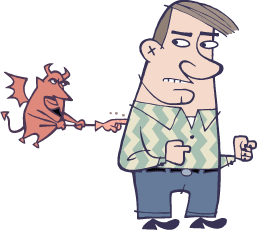
Seven Not-Quite-Deadly-but-Still-Annoying Sins
- I-told-you-so-dom
- Butt-in-ski-ness
- Wise-ass-ery
- Know-it-all-itude
- Behind-your-back-ery
- I’m-special-osity
- Holier-than-thou-ity
To be honest, we’re not sure why the seven deadly sins are deadly. Sloth, gluttony, and lust don’t kill other people, they just make you a lazy, fat lecher. Calling them deadly might be overselling it a tad. Could be just an old-timey attention getting device before they came up with web ad teasers like…
Seven Horrible Habits of the Damned
Filed 6/20/18
Near Infinite D.I.Y. daily Content

Pick the words from the pull down menus to form sentences for a fresh, unique terry colon point com daily entry of your very own. There are almost countless possible combinations. (Well, we didn’t count them, anyway.) Read ’em all! and we shouldn’t have to write another thing for months.
The the just like the the So don’t And you can quote yourself on that.
Filed 6/19/18
For Entertainment Purposes Only
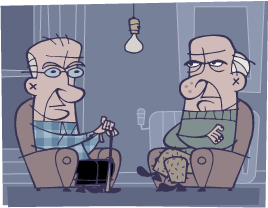
How many grumpy old men does it take to screw in a light bulb?
None. The lightbulb can screw itself.
Filed 5/29/18
Coming Soon: Neo Ice Age
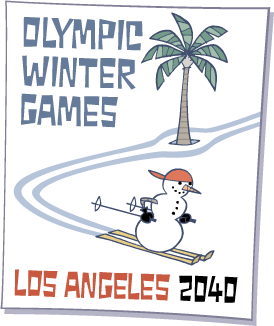
You may have missed the news, but global temperatures have gone down 0.5 degrees in the last 24 months. That’s at a rate of five degrees per decade. As the average temperature of an ice age is ten degrees cooler than today, if the trend continues we will be in a new ice age in twenty years. Now that would be an inconvenient truth.
Don’t Tell Anyone, But We Just Had Two Years Of Record-Breaking Global Cooling
Filed 5/21/18
What’s in a Name? Really. What Does Yours Mean?
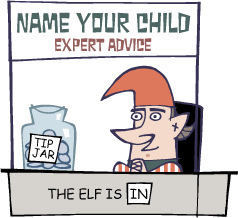
Though we don’t think of it much, names have meanings. For instance, what you do for a living: Carpenter, Cooper, Smith, Weaver. People don’t much name themselves after their occupation these days. Though there are thousands of new, modern jobs to be named after. Instead of Smith, the most common name now might be Bookkeeper, Pencilpusher, or Drudge. Still, it’d get confusing if you changed your last name every time you switched jobs.
First names have meanings, too. These are more obscure than surnames, people don’t know or care about their meanings anymore. It’s just a personal label our parents dubbed us because they liked the sound of it or whatever. That’s why a lot of people now have novel, totally made up, meaningless names. Check out an NBA team roster to see what we mean.
Ten Olde Names and Their Erstwhile Meanings
- Natalie –Birthday (As in natal)
- Sylvia –Living in the woods (As in sylvan)
- Felix –Happy (As in felicity)
- Melanie –Dark (As in melanin)
- Dolores –Lady of sorrow (As in dolorous; sounds like a bad pun but there it is)
- Portia –Pig (As in porcine)
- Calvin –Bald (As in… uh… we don’t know)
- Quincy –Fifth in a series (Don’t name your kids, number them)
- Cameron –Crooked nose (It’s a Gaelic thing)
- Alfred –Advised by elves (Old English ælf + ræd or rede*)
As you can see, names weren’t always very complimentary. Some are just plain weird. Name your kid Birthday? Guess goofy hippie names predate goofy hippies. Did Alfred the Great really have a council of wee folk? What kind of parents name their daughter Pig? Makes you wonder what the heck your parents named you, eh?
*Ræd or rede go back to an old oral usage of read, as used in “Read him his rights.”
Filed 5/11/18
The Overblown Legend of Pelé
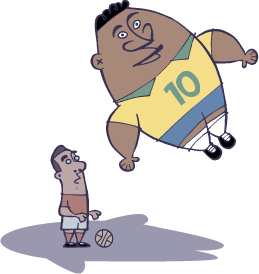
Just ask anyone; Pelé was the greatest soccer player ever, hands down, no argument, period! Then they’ll trot out these two bullet points of evidence:
- He scored 1,283 goals
- He won three World Cups
Let’s look at those from the bottom up. Single players do not win World Cups, teams do. Team championships are a feeble measure of one players ability. Was Yogi Berra the greatest baseball player ever because “he won the World Series” more than anyone else, ten times? Were Ted Williams, Ty Cobb, and Hank Aaron lesser players because their teams didn’t win any?
Pelé did little to help Brazil win the cup in 1962, he was injured and scored all of one goal. Basically Brazil won the World Cup without him. Thing is, Pelé was never the top goal scorer in any World Cup he played in. In 1958 he scored six, while Just Fontaine netted 13. In 1966 (also injured) he scored one, while Eusébio had nine. In 1970 he scored four to Gerd Müller’s ten and teammate Jairzinho’s seven.
Now then, what about those 1,283 goals? Pelé officially scored 757 goals in 812 games. The other 526 goals came in unofficial matches and tour games, including when he played for the Sixth Coast Guard in the military competition.
Even so, many of Pelé’s 757 official goals came against third-rate teams in Brazil’s state leagues. These leagues comprise all the pro teams within a state, regardless of level. Imagine a California Baseball League with the five major league teams, five triple-A teams, five double-A teams, and five A teams. Bobby Bonds probably wouldn’t have needed steroids to knock out 80 dingers a year against that competition.
Who might be better than Pelé? As of this writing Cristiano Ronaldo has notched 652 official goals and Lionel Messi has racked up 611. Ronaldo is 33 years old and Messi is 30, both have a pretty fair chance to surpass Pelé’s career goal mark. And against better competition.
Then there’s the “Galloping Major,” Ferenc Puskás, who scored 84 goals in 85 international games for Hungary. In the Hungarian and Spanish leagues he notched 514 goals in 529 matches. You might also consider Sporting Lisbon’s Fernando Peyroteo who in the 1930s and 40s amassed 539 goals in 334 official games. That’s an amazing 1.61 goals per game. In 1946-47 he tallied 43 goals in 19 games, 2.26 goals per game.
Filed 5/7/18
If You Have to Ask, You Didn’t Get the Job
Real-life questions from real-life applicants to real-life potential employers:
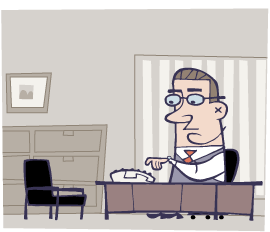
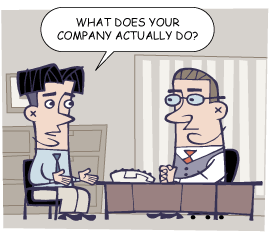
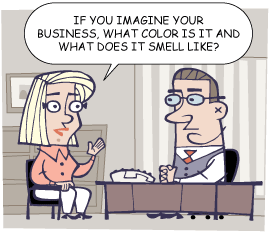
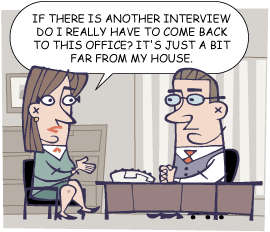
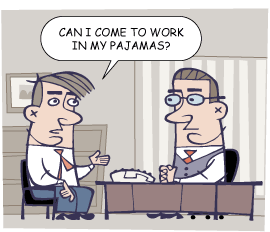
Source of quotes: Businessinsider.com.au
Filed 4/25/18
Monday Funnies
Real-life quotes from real-life people in real-life offices around the real-life world brought to you in an unreal-life cartoon:





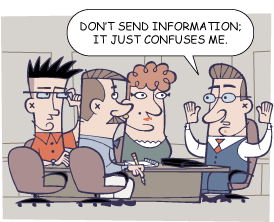
Source of quotes: overheardintheoffice.com
Filed 4/16/18
Extended Outlook

We will see Tuesday all day across the entire metro area, with an extremely high chance of Wednesday tomorrow. The end of the work week should bring us Friday, likely followed by two days of weekend. A Monday advisory for the tri-county area will be in effect starting next week, so plan accordingly. We expect this pattern to continue for the foreseeable future.
Filed 4/10/18
Today’s Forecast

Monday will be seasonably seasonal all day, starting with a low in sunlight early, getting gradually brighter by midday and tapering off toward the late afternoon into another low after sunset. Temperatures will range from Fahrenheit to Celsius depending on location. Doppler radar indicates an increase in doppling in the late morning hours. A chance of rain is in the air, until it falls onto the ground where it will turn into puddles. Wind will be left to right with occasional gusts from back to front. The barometer will continue falling until it hits the floor and breaks, probably. Strange weather symbols will appear toward sunset and will continue unless people start to complain they have no idea what they mean.
Filed 4/9/18
Anti-Kangaroo Words



If you read our previous kangaroo word bit, you’ll probably guess anti-kangaroo words contain an antonym, rather than a synonym, of the mother word. To follow the animal world metaphor, perhaps they might instead be cuckoo or cowbird words. If you don’t see the connection, a little research is in order:
Filed 3/21/18
Kangaroo Words
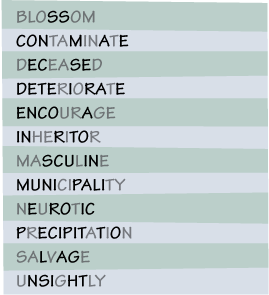

“What are kangaroo words?” we hear ourselves imagining the reader asking. There certainly doesn’t seem to be a connection or similarity among the listed words. Or does there? Kangaroo words contain synonyms of themselves. Not a clear explanation? Mouseover list box above and you’ll see.
What we have is a momma word with a closely related baby word tucked inside. Hense, kangaroo word. To complete the metaphor, the contained synonym is called a joey word.
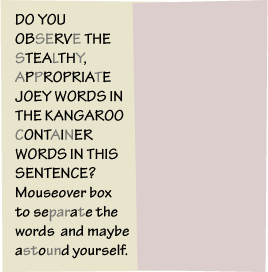

This particular bit of word weirdness doesn’t have a fancy Greek or Latin term, like endonym or whatever. That’s because it’s really a pretty useless attribute, just a curiosity to make you go, “Wow.” You know, like a palindrome; a word that reads the same forward and backward. Like, “Wow.”
Filed 3/19/18
We certainly hope you learned your lesson and won’t try that again.
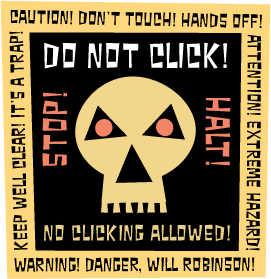

Accidental Optical Illusion


At first I thought a picture hanging on the wall was crooked and went to straighten it, but it was already straight. I had to step back and look again. It looked crooked. Took a minute to figure out why. Sunlight streaming through the miniblinds casting angled stripes on a framed photo created an optical illusion. I recreated it above in simplified form.
Mouse over the image and see what it looks like without the light bands. It’s square, eh?
The frame, mat and photo are square, but it looks cock-eyed on the bottom. Appearing as if the bottom right-hand corner is drooping, so to speak. Thing is, we run into optical illusions quite often without always noticing. I wrote about this a while back, and updated recently for your semi-fresh perusal.
Optical Illusions You Often Run Into
Originally filed 11/29/09
Flag Fun Redone
This is an update of something we did years ago, only this time webby and interactive. Because we know how to do that sort of thing now. We rewrote some bits, too. Redone and more fun, or rerun and no fun? You decide.

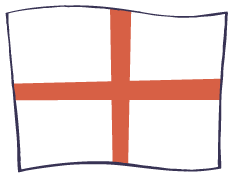
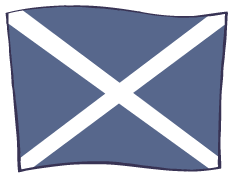
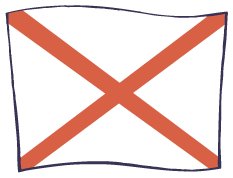
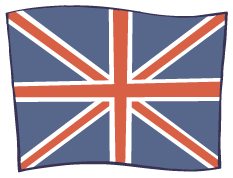
We have mentioned before our favorite national flag is the United Kingdom’s Union Jack. Though maybe it’s our three favorites, because it’s actually three flags in one. First is Saint George’s cross, which is England. (Mouseover tag to see each flag) Next is Saint Andrew’s cross, for Scotland. Finally there’s Saint Patrick’s cross, representing Ireland, or rather Northern Ireland since the rest of Ireland is a separate country. Mash them all up and you get the Union Jack.
You might wonder, what happened to Wales, where’s the Welsh flag in this combination Union Jack. After all, the Prince of Wales becomes the King, right? Wales was considered part of England when the very first Union Jack was devised in 1606 combining only the flags of England and Scotland. Ireland was added in 1801.
The Welsh flag has a dragon and not a saint’s cross for reasons we don’t know. (Mouseover “Wales” tag) Anyway, Saint George (England) slew the dragon, which might be another reason for its absence. Besides, adding the dragon rather makes a mess of the flag in our view. (Mouseover “Welsh Jack” tag)

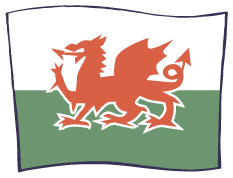
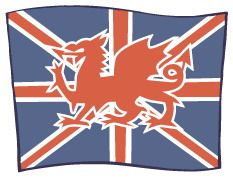
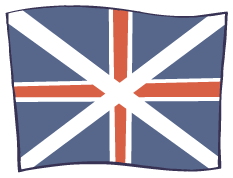
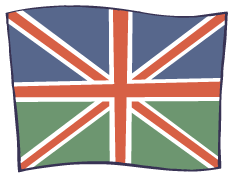
Many a Scotsman doesn’t care for that dominating England cross, preferring the flag have the Scotland cross foremost. (Mouseover “Scottish Jack” tag) Perhaps if they’d’ve had a better battle record against the English they’d get a little more sympathy for that view. At least they’re on the flag, unlike Wales. While slapping on the dragon is a bit much, an alternative update might be to add the green field from the bottom of the Welsh flag. (Mouseover “Revised Union Jack” tag)
Not sure that works all that well, but inclusiveness, diversity, equality, fraternity and all that. Just a thought.
Filed 3/5/18
The Future of Europe Is in Good Hands?

European Leader – Number of Children
- Austrian Chancellor Sebastian Kurz – zero
- British PM Theresa May – zero
- European Commission President Jean-Claude Juncker – zero
- French President Emmanuel Macron – zero
- German Chancellor Angela Merkel
– zero - Holland’s Mark Rutte – zero
- Italian PM Paolo Gentiloni – zero
- Luxembourg’s Xavier Bettel – zero
- Scotland’s Nicola Sturgeon – zero
- Sweden’s Stefan Löfven – zero
If, as they say, children are our future, what do we make of that? Coincidence, Zeitgeist, or omen, boys and girls? … Boys and girls? … Hello, anyone there?
Filed 3/2/18
Five Letters Dropped from the English Alphabet…
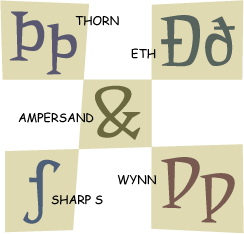
…and our own possible, plausible, but mostly unsubstantiated explanations of why we no longer have them.
Thorn was a single letter for the ‘th’ sound. Typesetters who didn’t have a thorn character would substitute a Y in its place. That’s where the Y in ‘Ye Olde Shoppe’ and such comes from. Which should be pronounced ‘the’ and not ‘yee.’ If these quaint boutiques wanted to be really old-timey accurate, they’d use thorn instead of Y. Though most folks wouldn’t know how to say that, either.
Eth was a single letter for the ‘th’ sound. Wait, didn’t we just do that? Oh, that was thorn. Why there were two letters for ‘th’ is a mystery to us. We suppose it was a mystery to other people as well since they jettisoned eth along with thorn way back when. Plus, if you dotted your i’s, but forgot to cross your eth’s, they’d be d’s. We dink dat’s right.
Sharp S was a funny-looking S that’s hard to tell from a lower case F. You see it in the Declaration of Independence and other period writing. The sharp S sounded exactly like an S and was only used in specific cases depending on… We don’t know. The rules for when to use which S are persnickety and confusing. And rather pointless, really, since it’s an S in either case. Which we suppose is why they axed the thing.
Wynn was the original W. Maybe. The English alphabet is picked up wholesale from the Latin alphabet, except there was no W because V was W, or vhatewer. So V was wee and not vee. Again, maybe. English needed another letter because it had both sounds. Still does. So V was vee and they grabbed that Greek-looking wynn to use for wee. Well, not everybody and not always and not for long. Some folks used ‘uu’ for wee. Which eventually got fused together as one letter, double-u. Though it looks like a double vee (VV, vv) and not a double-u (UU, uu).
Ampersand at one time was a letter, said as ‘and,’ meaning ‘and.’ You might call it a letter-word, though you couldn’t spell other words with it and so not very h&y. To us, that makes ampersand a symbol for a word, like $ and ¢ which are not in the alphabet, and not a letter. It would seem other folks came to the same conclusion as ampersand was demoted to the alphabet extensions ranks joining the numbers, punctuation and whatnot.
Filed 2/23/18
A.I. (Artificial Imbecility)




Click pic to replay animation
“You never know how smart a moron is until you try to program a robot”
Which is to say we’re a lot further away from cyborgs and the like than computer engineers hoped or imagined.
Filed 2/16/18
Gracias Where Gracias Is Due
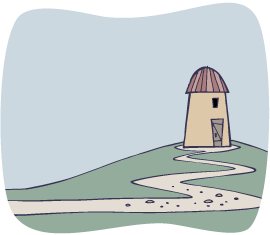
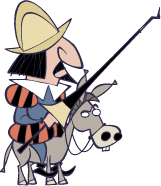

What Do the Following Common Turns of Phrase Have in Common?
- Mum’s the word
- Thank you for nothing
- The sky’s the limit
- No love lost
- Give the devil his due
- A stone’s throw
- Smell a rat
We have Cervantes to thank. They all come from Don Quixote (or as some have it, Donkey Hotey) which was initially published in 1604, under the title The Ingenious Knight of La Mancha. Old William Shakespeare ain’t the only one who could coin a good cliché. The book is also where the phrase ‘tilting at windmills’ comes from. Tilting is jousting. In the book our eponymous hero attacks (tilts at) windmills under the delusion he’s fighting giants. As Cervantes wrote:
“Fortune is guiding our affairs better than we ourselves could have wished. Do you see over yonder, friend Sancho, thirty or forty hulking giants? I intend to do battle with them and slay them. With their spoils we shall begin to be rich for this is a righteous war and the removal of so foul a brood from off the face of the earth is a service God will bless.”
“What giants?” asked Sancho Panza.
“Those you see over there,” replied his master, “with their long arms. Some of them have arms well nigh two leagues in length.”
“Take care, sir,” cried Sancho. “Those over there are not giants but windmills.”
Another term with a similar meaning to tilting at windmills –quixotic. One guess where that comes from.
Filed 2/9/18
Don’t Say We Didn’t Try to Warn You
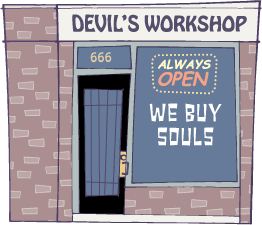
Top Ten Reasons Why Not
- You’ll poke somebody’s eye out
- You’ll catch your death of cold
- You’ll break your neck
- You’ll go blind
- You’re too young
- You’re too old
- It’s not as easy as you think
- It won’t do any good
- You’ll just make it worse
- We’ll tell mom
Filed 1/19/18
Back from the Might as Well Be Dead

Our slumber is over and so we return you to our irregularly unscheduled content. Which we are sure the reader has been eagerly anticipating with bated breath. Bate. Another one of those old words you rarely run across outside of a clichéd old phrase. “With bated breath.” Though you sometimes run across its synonymous sibling, abate.
In fact, bate is an aphetic version of the original word, abate. Aphetic simply means a word has lost bits. For example, the trailer containing fuel behind a locomotive is called a tender, which is a shortened version of attender. Along the same lines, bus is a shortening of omnibus. We suppose a modern example is blog being an aphetic version of weblog.
Asides aside, you also don’t much stumble upon bate’s other meanings. From the sport of falconry you have bate as a verb meaning the action of a falcon held by the talons beating its wings to take off. From which comes a noun variant, a state of violent agitation. From tanners we get a verb definition, to soak leather after liming in an alkaline solution to soften and remove the lime. That alkaline solution was called bate, now its a noun.
See what you’ve been missing? Well, we’re glad we’re back anyway.
Filed 1/10/18